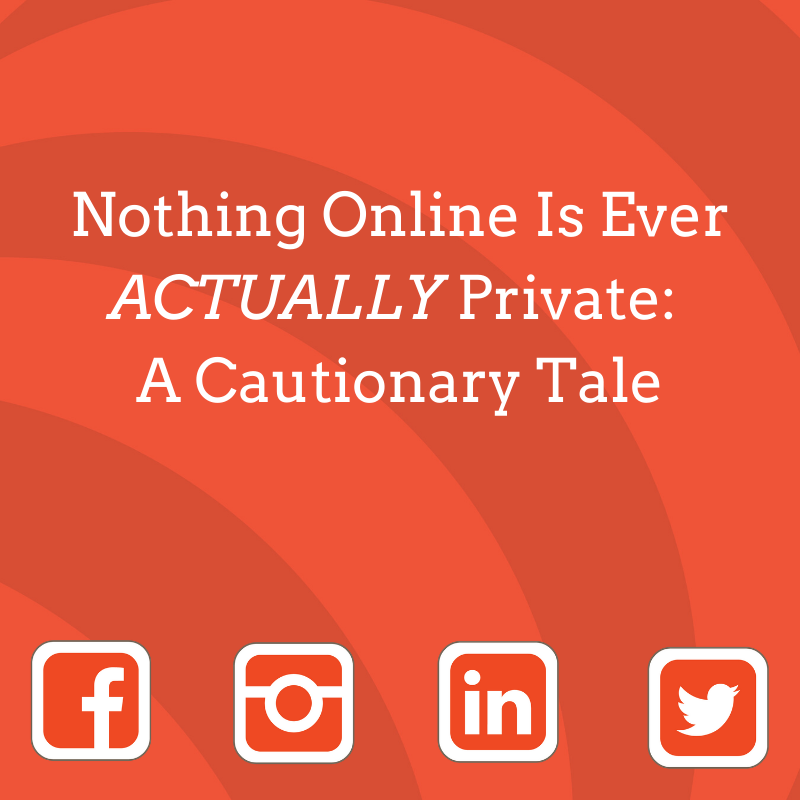Nothing Online is Ever Actually Private: A Cautionary Tale
I LOVE Twitter lists. They are an amazing listening tool, helping to bring order and clarify to the chaos that is the Twittersphere.
You can use them to easily simplify who you are following at any given moment on Twitter. While I follow many accounts, there are times where I ONLY want to know what a few of them are saying. So I have a Twitter list just for them.
I love them so much, the second episode of my podcast, #StepUpYourSocial, was about how, when and why to use them. (You can listen to that episode at stepupyoursocial.com or wherever you stream podcasts).
Whenever I run trainings on Twitter, I always highly recommend that people utilize this amazing tool.
I even include it on my list of free tools you should be using but probably aren’t and recommend that even if your brand isn’t on Twitter, you have an account you can use to build lists and monitor your competitors, customers, influencers, etc. just as a way to keep tabs on your field.
So yeah, I’m a fan.
There are two types of lists: public and private.
Public lists can be followed by anybody and they are visible through your profile. And whenever you add someone to such a list, they get a notification. They are public.
Private lists on the other hand exist only for you. No one will ever know that such a list exists. No one can follow it or even find it unless they are logged in as you. And of course no one knows when you add them to it. They are private.
But here’s the thing — nothing online is ever actually private.
When I build private lists for political campaigns, I also give them overly-guarded innocuous names like “interesting” or “other campaigns.” I would never call them “competition,” “the enemy,” or, as we’ll soon see, “haters.”
Likewise, when I work with businesses or nonprofits on developing their own listening tools or prepping them for crisis management, I always push them to do the same. Don’t call the trolls “trolls.” Call them “interesting accounts,” or “people to follow.”
Why? you might ask. These are private lists. No one will ever know that they exist.
Well, that’s true. Right up until it’s not.
I was (and am) always afraid of hacking. I have run very large Twitter accounts and you never know what’s going to happen. If heaven forbid someone hacked into one of those accounts, it would be awful. Because they could post whatever they wanted.
But there would be nothing incriminating or embarrassing in those accounts for them to find. Because our campaign doesn’t have “enemies” or “haters.” It has “accounts to follow” or “notables.” It would have to be a pretty quiet news day for that story to get written.
Well as it turns out, my caution was extremely valid. Because Vice just reported on a bug that led to people being notified when they were added to… private lists. 😳 😳 😳
The bug was first noticed when a Vice reporter was added to a PRIVATE list called… you guessed it… “haters.”
Who’s fault was this? Twitter’s of course!
Who’s problem is it though (should it happen to you)? Yeah, YOU know.
I always advise that you never put anything in writing you aren’t prepared to see in the paper. But that advice definitely goes beyond writing.
Being in a sketchy Facebook Group — even if it’s a secret Group — can still come out. Having a secondary account you use online to talk about how hot or awesome you are… is stupid. And risky!
And labeling Twitter lists, even private ones, with any name that would embarrass you were it to come out — is just a bad idea.
Be smart out there y’all! The internet is our permanent record.

Leave a Reply
Want to join the discussion?Feel free to contribute!